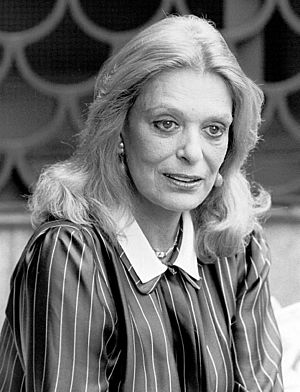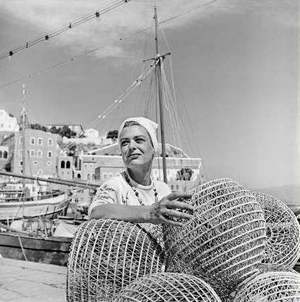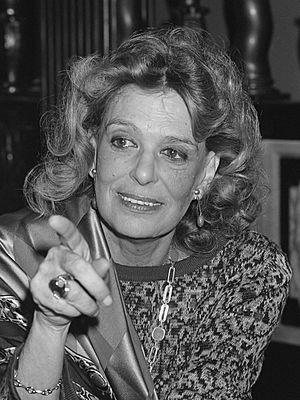Melina Mercouri facts for kids
Quick facts for kids
Melina Mercouri
|
|
|---|---|

Mercouri in 1982
|
|
| Minister for Culture | |
| In office 13 October 1993 – 6 March 1994 |
|
| Prime Minister | Andreas Papandreou |
| Preceded by | Dora Bakoyanni |
| Succeeded by | Thanos Mikroutsikos |
| In office 21 October 1981 – 2 July 1989 |
|
| Prime Minister | Andreas Papandreou |
| Preceded by | Andreas Andrianopoulos |
| Succeeded by | Anna Psarouda-Benaki |
| Member of the Hellenic Parliament for Piraeus B |
|
| In office 20 November 1977 – 6 March 1994 |
|
| Personal details | |
| Born |
Maria Amalia Mercouri
18 October 1920 Athens, Greece |
| Died | 6 March 1994 (aged 73) Upper East Side, New York City, U.S. |
| Resting place | First Cemetery of Athens |
| Political party | PASOK |
| Spouses |
|
| Parents |
|
| Alma mater | National Theatre of Greece Drama School |
| Occupation |
|
Melina Mercouri (born Maria Amalia Mercouri on 18 October 1920 – died 6 March 1994) was a famous Greek actress, singer, and politician. She came from a well-known political family in Greece. Melina Mercouri was nominated for an Academy Award and won a Cannes Film Festival Best Actress Award for her role in the movie Never on Sunday (1960). She was also nominated for other major awards, including a Tony Award, Golden Globes, and BAFTA Awards.
As a politician, she was a member of the PASOK party and served in the Hellenic Parliament. In October 1981, Mercouri made history by becoming the first female Minister of Culture and Sports in Greece. She held this important position for many years, from 1981 to 1989, and again from 1993 until her death in 1994.
Contents
About Melina Mercouri
Her Family Background
Melina Mercouri's family, the Mercouris, was a very important family in Greece. They came from a region called Argolida. Members of her family had even fought in the Greek Revolution of 1821.
Her grandfather, Spyridon Mercouris, was the mayor of Athens for many years. Her father, Stamatis Mercouris, was a cavalry officer and also served as a member of parliament and a government minister. He was also involved in managing the famous Panathinaikos sports team.
Melina's mother, Irene Lappa, had a brother named Pyrros Lappa. He was an admiral in the navy and held important positions, including leading the Olympic Games Committee.
Melina also had an uncle, George S. Mercouris, who had very different political ideas. He was involved with a different political group during a difficult time in Greece.
Her Education and Early Life
In September 1938, Melina Mercouri was accepted into the Drama School of the National Theatre of Greece. This is where she trained to become an actress.
In 1939, she married Panagis Harokopos, a wealthy landowner.
During a Difficult Time in Greece
During World War II, when Greece was occupied by foreign forces, Melina Mercouri was criticized by some for living comfortably. However, she later said in her autobiography that she took responsibility for not directly joining the Resistance against the occupation.
Many people who knew her during this time said that Melina was very kind and helpful. She often hosted people, gave them food, and helped her friends. The writer Alkis Zei said that Melina even hid people who were against the occupation and gave them money.
Melina's brother, Spyros Mercouris, was part of the Resistance. According to some stories, Melina would secretly take money and give it to her brother to help the Resistance. She also hid him and his friends. Despite her husband's concerns, Melina's home was always open to people in need, offering them food and shelter.
Melina showed her dislike for the occupiers in various ways. Once, she even disobeyed soldiers from the SS at a bar, even though it was dangerous. Many people who were active in the Resistance became her close friends, including the writer Iakovos Kambanellis and the actor Manos Katrakis.
During the Greek Civil War, Melina Mercouri visited her friends and colleagues who had been arrested for their political beliefs, showing her support.
Later Relationships
In the late 1940s, Melina Mercouri was in a relationship with Pyrros Spyromilios for seven years. He was a naval officer and a war hero. His death in 1961 deeply saddened Melina, even though they had separated years before.
In 1955, she starred in her first feature film, Stella. While this film was shown at the Cannes Film Festival, she met and fell in love with Julius "Jules" Dassin. They later married and stayed together for the rest of her life.
Her Performing Career
Early Years on Stage
After finishing drama school, Melina Mercouri joined the National Theatre of Greece. In 1945, she played the role of Electra in a play called Mourning Becomes Electra. In 1949, she had a big success playing Blanche DuBois in A Streetcar Named Desire.
After 1950, she moved to Paris, France, where she performed in plays and met famous writers like Jean Cocteau and Jean-Paul Sartre. In 1953, she won the Marika Kotopouli Prize for her acting. She returned to Greece in 1955 and starred in plays like Macbeth by William Shakespeare.
Becoming an International Star
Melina Mercouri's first movie was the Greek film Stella (1955). This film was praised at the 1956 Cannes Film Festival, where she met the American film director Jules Dassin. They worked together on many films, and he later became her husband. Their first movie together was He Who Must Die (1957).
She became famous worldwide when she starred in Never on Sunday (1960), which Jules Dassin directed. For this role, she won the Best Actress Award at the 1960 Cannes Film Festival and was nominated for an Academy Award for Best Actress.
She continued to star in successful films like Phaedra (1962) and Topkapi (1964), earning more nominations for her acting. She worked with many famous directors.
In 1967, she performed on Broadway in the musical Illya Darling, which was based on her film Never on Sunday. For this, she was nominated for a Tony Award for Best Performance by a Leading Actress in a Musical.
Melina Mercouri focused on her stage career in later years, performing in classic plays and ancient Greek tragedies. Her last film role was in A Dream of Passion (1978), directed by her husband.
In 1987, she received a special prize from the Europe Theatre Prize for her dedication as an artist who combined her acting with her political beliefs and her vision for European culture. Her very last performance on stage was in an opera in 1992.
Her Work as a Singer
Melina Mercouri also had a singing career. One of her first songs was "Hartino to Fengaraki" ("Papermoon") from the Greek production of A Streetcar Named Desire in 1949.
Her songs "Athenes, ma Ville" and "Melinaki" were very popular in France.
Her Political Career
Fighting Against the Greek Dictatorship
When a group of military colonels took over Greece in a coup d'état on 21 April 1967, Melina Mercouri was in the United States. She immediately joined the fight against this military government, known as the Greek military junta. She traveled around the world to tell people what was happening in Greece and to help isolate the colonels' regime.
Because of her actions, the military government took away her Greek citizenship and seized her property. When this happened, she famously said: "I was born a Greek and I will die a Greek. Those bastards were born fascists and they will die fascists." She worked with others in London to oppose the junta.
Getting Involved in Politics
After the military government fell in 1974, Melina Mercouri returned to Greece. She became one of the founding members of the Panhellenic Socialist Movement (PASOK), a centre-left political party. She was an important member of the party and also supported women's rights.
In the Greek elections of 1974, she ran for parliament but narrowly missed winning a seat. However, she was successful in the elections of 1977 after a strong campaign.
Minister for Culture: 1981–1989
When PASOK won the elections in 1981, Melina Mercouri was appointed Minister for Culture of Greece. She was the first woman to hold this position. She served two terms as Minister of Culture, from 1981 until 1989.
As Minister for Culture, Melina Mercouri used her international fame to promote Greece to other European leaders. She strongly argued for the return of the Parthenon Marbles to Athens. These ancient sculptures were taken from the Parthenon and other buildings on the Acropolis of Athens by Thomas Bruce, 7th Earl of Elgin and are now in the British Museum in London.
In 1983, she had a televised debate with the director of the British Museum about the marbles. She also started an international competition to design the New Acropolis Museum, which was built to display the marbles if they were returned.
One of her biggest achievements was creating the idea of the European Capital of Culture. This program helps to highlight the culture of different European cities each year. Athens was the very first city to be named European Capital of Culture in 1985, thanks to her efforts. She also strongly supported Athens' bid to host the Centennial Olympic Games in 1996.
In 1983, during Greece's turn to lead the Council of the European Union, Mercouri invited the Culture Ministers from other European countries to discuss culture. This led to regular meetings between European Union Culture Ministers.
She also supported cooperation between Eastern Europe and the European Union in cultural matters. Melina Mercouri also ordered a study to connect all the ancient sites in Athens into a car-free archaeological park to promote Greek culture. She made museums and archaeological sites free for Greek citizens, organized exhibitions of Greek art around the world, and supported the completion of the Athens Concert Hall.
In June 1986, Melina Mercouri gave a powerful speech at the Oxford Union about the Parthenon Marbles. She argued that the marbles were more than just art to Greece; they were a vital part of Greek heritage and identity. She said: "You must understand what the Parthenon Marbles mean to us. They are our pride. They are our sacrifices. They are our noblest symbol of excellence. They are a tribute to the democratic philosophy. They are our aspirations and our name. They are the essence of Greekness."
Minister for Culture: 1993–1994
In the elections of November 1989, PASOK lost, but Mercouri was re-elected as a member of the Hellenic Parliament. In 1990, she ran for Mayor of Athens but did not win.
After PASOK won the election of 1993, she was again appointed Minister for Culture. In this short second term, her main goals were to create a cultural park in the Aegean Sea to protect the environment and culture of the Aegean Islands, and to connect culture with education at all levels.
Her Passing
Melina Mercouri passed away on 6 March 1994, in New York City, from lung cancer.
Her husband, Jules Dassin, was her only immediate family member. They did not have any children. She received a state funeral with honors from the Prime Minister. She was buried at the First Cemetery of Athens four days later.
After her death, her husband founded the Melina Mercouri Foundation. UNESCO also created the Melina Mercouri International Prize, which recognizes great efforts to protect and improve cultural landscapes around the world.
Her Works
Filmography
| Year | Title | Role | Notes |
|---|---|---|---|
| 1955 | Stella | Stella | |
| 1957 | He Who Must Die | Katerina | |
| 1958 | The Gypsy and the Gentleman | Belle | |
| 1959 | The Law | Donna Lucrezia | |
| 1960 | Never on Sunday | Ilya | Won—Cannes Film Festival Best Actress Award Nominated—Academy Award for Best Actress Nominated—BAFTA Award for Best Foreign Actress Nominated—New York Film Critics Circle Award for Best Actress |
| 1961 | Long Live Henry IV... Long Live Love | Marie de Médicis | |
| The Last Judgment | Foreign lady | ||
| 1962 | Phaedra | Phaedra | Nominated—BAFTA Award for Best Foreign Actress Nominated—Golden Globe Award for Best Actress in a Motion Picture – Drama |
| 1963 | The Victors | Magda | |
| Canzoni nel mondo | Herself | ||
| 1964 | Topkapi | Elizabeth Lipp | Won—Golden Plate David di Donatello Award Nominated—Golden Globe Award for Best Actress – Motion Picture Comedy or Musical |
| 1965 | The Uninhibited | Jenny | |
| 1966 | A Man Could Get Killed | Aurora | |
| 10:30 P.M. Summer | Maria | ||
| 1969 | Gaily, Gaily | Lil | |
| 1970 | Promise at Dawn | Nina Kacew | Nominated—Golden Globe Award for Best Actress in a Motion Picture – Drama |
| 1974 | The Rehearsal | Belle | |
| 1975 | Once Is Not Enough | Karla | |
| Kipros | Herself | ||
| 1977 | Nasty Habits | Sister Gertrude | |
| 1978 | A Dream of Passion | Maya | |
| 1981 | Gynaikes stin exoria | Narrator | Voice, short, (final film role) |
Tributes
The song "Melina" by Camilo Sesto (from his 1975 album Amor libre) was dedicated to Melina Mercouri.
On 18 October 2015, Google Doodle celebrated her 95th birthday.
Images for kids
See also
 In Spanish: Melina Mercouri para niños
In Spanish: Melina Mercouri para niños
 | Janet Taylor Pickett |
 | Synthia Saint James |
 | Howardena Pindell |
 | Faith Ringgold |




